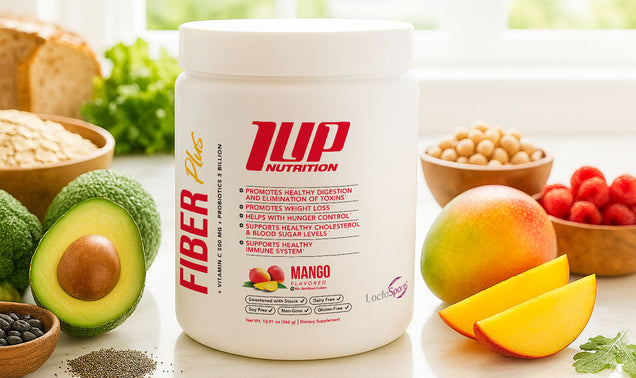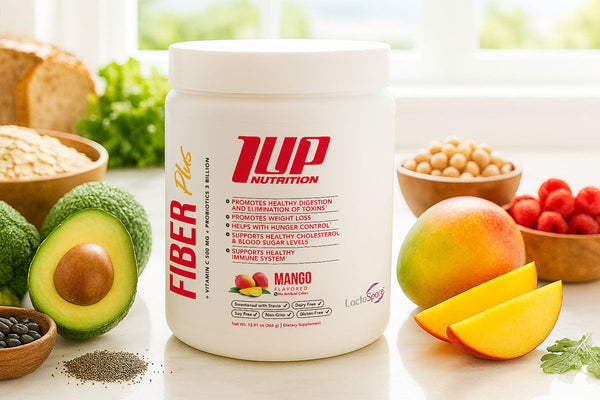Have you ever felt sluggish, bloated, stopped up, or constantly hungry?
You’re not alone.
These are hallmark signs of not eating enough fiber.
Estimates indicate that over 90% of Americans aren’t consuming enough fiber daily. Experts recommend eating 14 grams of fiber for every 1,000 calories consumed. This averages out to 25 grams of fiber per day for women and 38 grams for men.[1]
Today, we’ll help you spot the signs of low fiber intake, and the best ways to increase your fiber intake.
Risks of Not Getting Enough Fiber
Knowing what can go wrong when you don’t eat enough fiber can help motivate you to make it a priority. A low-fiber diet doesn’t just mess with your digestion—it can lead to more serious health problems over time, including[2,3]:
- Increased risk of heart disease
- Poor blood sugar regulation
- Difficulty maintaining a healthy weight
- Increased risk of colon cancer
- Increased risk of depression
- Gut dysbiosis
- Leaky gut
Symptoms of a Low-Fiber Lifestyle
Symptoms of low-fiber intake can vary from subtle (sluggishness, mild bloating, etc.) to very obvious (constipation, cramping, etc).
Here are some of the tell-tale signs that you’re in need of some additional fiber:
Constipation
Fiber serves multiple functions in a healthy digestive system. First, it serves as a valuable source of energy for the good bacteria in your gut. Second, it helps pull water into your GI tract, which softens stool. Third, fiber adds bulk to your stool.
Without adequate daily fiber intake, stool can become hard, dry, and difficult to pass. Low-fiber diets can also lead to irregularity which increases bloating, GI discomfort and the development of hemorrhoids (due to straining in the bathroom).
Weight Loss Feels Hard
Weight loss usually is a matter of calories in versus calories out. However, if you’re not eating enough fiber but still maintaining a calorie deficit, weight loss can feel hard.
Eating enough fiber not only helps your body’s digestive system run smoothly, it also helps to keep hunger in check. The reason for this is that fiber-rich foods help to take up space in your stomach and slow the digestive process, both of which contribute to feelings of satiety. In fact, research finds that using fiber supplements may facilitate weight loss through reduced frequency of eating and food consumption.[4]
Furthermore, consuming enough fiber at mealtime helps to slow the release of carbohydrates (energy) into the bloodstream, which keeps blood sugar levels from rising and falling rapidly. This brings us to our next point…
Lack of Energy
Blood sugar spikes and crashes have your body on a constant roller coaster of feeling energized one moment and drained shortly thereafter. This can lead to a constant reliance on caffeine and/or snacking to keep that feeling of being “energized” going throughout the day.
To avoid this from happening make sure your meals include complex carbohydrates like fruits, veggies, whole grains, nuts, seeds, and legumes, which provide sustained energy to keep you going strong all day.
Bonus tip: Getting enough sleep also helps to combat feelings of low energy each day, so make sure you’re getting 7-9 hours of quality sleep each night. And, if you need help with evening relaxation and deep sleep, consider a nighttime relaxation and recovery aid like Recharge PM or Beauty Dream PM, which contain natural, non-habit forming ingredients that promote deep sleep and won’t leave you feeling groggy in the morning.
Irritable Bowel Syndrome (IBS) Flare Ups
Irritable bowel syndrome (IBS) is a GI disorder characterized by diarrhea, constipation, or a combination of the two. Estimates indicated that in the United States, 10%–15% of adults have IBS, with women being diagnosed at twice the rate of men.[5]
Fiber intake plays a key role in managing IBS symptoms. Too little fiber can worsen constipation and increase symptoms of cramping, bloating, and/or gas.
How to Get Enough Fiber
If you’re struggling to get reach your daily fiber goal, here are some expert-recommended tips to consider:
Start Slow
If you are currently consuming a low-fiber diet and want to increase your fiber intake, please slowly start increasing your fiber intake. Drastically increasing your fiber intake in a short time can actually lead to gassiness, bloating, GI distress and/or diarrhea.
With that in mind, experts recommend a gradual increase in daily weekly fiber intake. For example, if you’re currently consuming 10 grams of fiber per day, aim to get 15 grams of fiber each day this week. Next week, increase to 20 grams of fiber per day, and so on until you achieve the daily recommended fiber intake goals.
Eat More Plant Foods
Plant-based diets are natural high-fiber diets due to the fact that plant foods contain fiber. Keep in mind that you don’t have to go full vegetarian or vegan, but including plant foods in most/all of your major meals throughout the day can help you meet your daily fiber goals.
Variety is your friend when it comes to adding fiber to your diet. Here are some of our favorite food groups to include that help us reach our fiber goals:
- Fruits
- Veggies
- Whole grains
- Legumes
- Nuts/nut butters
- Seeds
Start Your Day with Fiber
Starting your day with a fiber-rich breakfast can help set the tone for the rest of your day. Incorporating fiber-rich foods into your breakfast can help keep you feeling energized during that early morning push and keep you from diving headfirst into the donuts in the breakroom.
Try some of these fiber-rich breakfast options:
- Breakfast smoothie with whey protein, frozen berries and frozen spinach
- Avocado toast with whole-grain bread and a side of eggs and fresh fruit
- Breakfast burrito that includes sauteed veggies
- Protein oatmeal with 1UP protein powder, old-fashioned oats, walnuts, and fresh/frozen fruit
Snack Smart
Instead of reaching for crackers, chips or “energy bars” (which are essentially sugar bombs marketed as “healthy snacks”), choose dry-roasted nuts, seeds, raw veggies, fresh fruit, or homemade hummus. For added nutrition and muscle recovery, add a serving of Greek yogurt or string cheese, which contributes some much needed protein
How to Know You’re Eating Enough Fiber
Not sure if you’re hitting your fiber goals? You’re not alone.
The average person doesn’t track their fiber intake, which means he/she is likely not getting enough. The good news is that keeping an eye on your daily fiber intake has never been easier!
The 1UP Fitness App makes it simple by tracking your daily fiber intake, so you can see which meals or snacks during the day may be lacking in this critical gut health nutrient.
In addition to consuming enough whole foods, it may also be beneficial to incorporate a fiber supplement into your daily regimen.
1UP Fiber Plus delivers an impressive 7 grams of fiber per serving, from high-quality sources including viscous fibers like psyllium husk! We’ve also included vitamin C as well as heat-stable probiotics (as LactoSpore) to further support gut health and regularity.
References
- https://nutrition.org/most-americans-are-not-getting-enough-fiber-in-our-diets/
- Barber TM, Kabisch S, Pfeiffer AFH, Weickert MO. The Health Benefits of Dietary Fibre. Nutrients. 2020 Oct 21;12(10):3209. doi: 10.3390/nu12103209. PMID: 33096647; PMCID: PMC7589116.
- Mathers JC. Dietary fibre and health: the story so far. Proc Nutr Soc. 2023 May;82(2):120-129. doi: 10.1017/S0029665123002215. Epub 2023 Feb 14. PMID: 36786062.
- Solah V.A., Kerr D.A., Hunt W.J., Johnson S.K., Boushey C.J., Delp E.J., Meng X., Gahler R.J., James A.P., Mukhtar A.S., et al. Effect of Fibre Supplementation on Body Weight and Composition, Frequency of Eating and Dietary Choice in Overweight Individuals. Nutrients. 2017;9:149. doi: 10.3390/nu9020149.
- https://aboutibs.org/what-is-ibs/facts-about-ibs/






